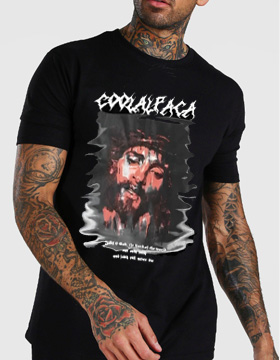Garment-Dyed vs. Pigment-Dyed T-Shirts
Garment-Dyed vs. Pigment-Dyed T-Shirts:A Complete Guide for Clothing Merchants
The t-shirt market is evolving rapidly, with customers increasingly seeking styles that blend aesthetics, comfort, and uniqueness. Among the many trends in fabric finishes, garment-dyed and pigment-dyed t-shirts stand out as popular options. For clothing brand merchants, understanding these dyeing processes is crucial to making informed product decisions that cater to diverse consumer preferences.
This comprehensive guide dives deep into the differences, benefits, and considerations of garment-dyed and pigment-dyed t-shirts, helping you choose the right option for your brand.

What Does Garment-Dyed Mean?
Garment-dyeing refers to the process of dyeing a t-shirt after it has been fully constructed. Unlike traditional methods where the fabric is dyed before cutting and sewing, garment dyeing allows for more uniform and vivid color finishes.
Key Features:
· Vibrant Colors: Garment-dyed t-shirts are known for their rich, saturated hues.
· Softened Fabric: The dyeing process often softens the fabric, giving it a broken-in, comfortable feel.
· Unique Texture: Since the dye penetrates the fibers of the constructed garment, it achieves a lived-in texture that adds depth and character.
Ideal For: Clothing brands that want to offer premium-quality t-shirts with a vintage or washed look, often appealing to customers seeking an elevated casual style.
What Does Pigment-Dyed Mean?
Pigment-dyeing uses pigments (color particles that sit on the fabric's surface) rather than dyes that chemically bond with the fibers. This process results in a distinctive, weathered appearance, often giving garments a slightly faded or "washed-out" effect.
Key Features:
Muted Tones: Pigment-dyed t-shirts often feature subdued, earthy, or pastel colors.
Distinct Look: The process creates a subtle variation in color across the garment, making each piece unique.
Firmer Texture: Because the pigment rests on the surface, the fabric may have a slightly stiffer feel initially.
Ideal For: Brands that target customers who love vintage aesthetics and distressed finishes, perfect for laid-back or bohemian styles.
Side-by-Side Comparison: Garment-Dyed vs. Pigment-Dyed
|
Feature
|
Garment-Dyed
|
Pigment-Dyed
|
|
Color Saturation
|
Rich and vibrant
|
Soft and muted
|
|
Fabric Feel
|
Softened with a broken-in texture
|
May feel firm initially, softens over time
|
|
Durability of Dye
|
Strong bond with fibers, durable over washes
|
Surface color may fade with washing
|
Aesthetic Appeal | Uniform, polished color | Weathered, vintage finish |
Customization | Better suited for consistent branding | Best for brands embracing uniqueness |
Price Point | Slightly higher due to added quality steps | Often more affordable |
Pros and Cons of Each Process
Garment-Dyed T-Shirts
Pros:
· Creates high-quality, vibrant colors.
· Fabric is softer and more comfortable.
· Greater consistency in color and finish.
Cons:
· Typically more expensive.
· Limited color palette due to the dyeing process.
Pigment-Dyed T-Shirts
Pros:
· Offers a unique, vintage aesthetic.
· Perfect for creating one-of-a-kind garments.
· Generally more cost-effective.
Cons:
· Color may fade unevenly over time.
· Fabric can feel slightly coarse until washed multiple times.
Choosing the Right Option for Your Brand
When deciding between garment-dyed and pigment-dyed t-shirts, consider your target audience, brand ethos, and intended price point. Here’s how to align your decision with your business goals:
1. Audience Preference:
· If your customers value vibrant, high-quality finishes, go for garment-dyed.
· If they prefer a more relaxed, vintage vibe, pigment-dyed is ideal.
2. Brand Positioning:
· Premium or eco-conscious brands may find garment-dyed t-shirts align with their ethos due to their superior finish.
· Niche or casual brands may appreciate the artistry of pigment-dyed garments.
3. Cost Management:
· If you’re operating on a tighter budget, pigment-dyed options offer more affordable entry points while maintaining unique aesthetics.
How to Market These T-Shirts
Once you’ve chosen your preferred dyeing process, focus on effective marketing strategies:
· Highlight the Process: Share visuals or videos of the garment or pigment-dyeing process to emphasize craftsmanship.
· Educate Customers: Use your product descriptions to explain the benefits of each method, emphasizing comfort, color, and style.
· Promote Sustainability: Many garment-dyed options use eco-friendly dyes, a major selling point for today’s conscious consumers.
Why Choose Wetowear for Your T-Shirt Needs?
At Wetowear, we pride ourselves on providing:
· Exceptional Quality: All our t-shirts undergo rigorous testing to ensure durability and comfort.
· Variety of Styles: From classic cuts to trendy fits, our inventory caters to diverse brand aesthetics.
· Customization Options: Whether you need blank t-shirts for screen printing or embroidery, we have you covered.
Ready to elevate your t-shirt collection? Visit Wetowear today to explore our full range of garment-dyed and pigment-dyed t-shirts.

Final Thoughts
Both garment-dyed and pigment-dyed t-shirts bring unique aesthetics to your collection, catering to different customer tastes and price points. By understanding their core differences, you can make confident decisions that align with your brand strategy and market demand.
For merchants, the best strategy may involve offering a mix of both styles to cater to a wider audience. Whether your customer loves the vibrant durability of garment-dyeing or the artsy charm of pigment-dyeing, Wetowear has the perfect options to meet their needs—and keep them coming back for more.
Would you like assistance in selecting styles tailored to your brand? Get in touch with us at Wetowear today!


